Essential Guide to Downloading Music Albums Safely
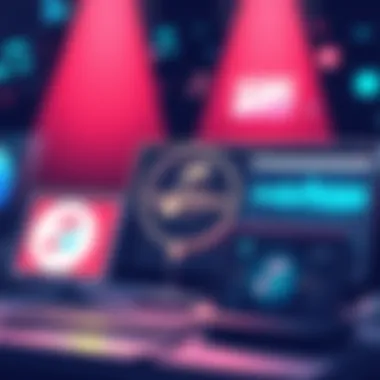
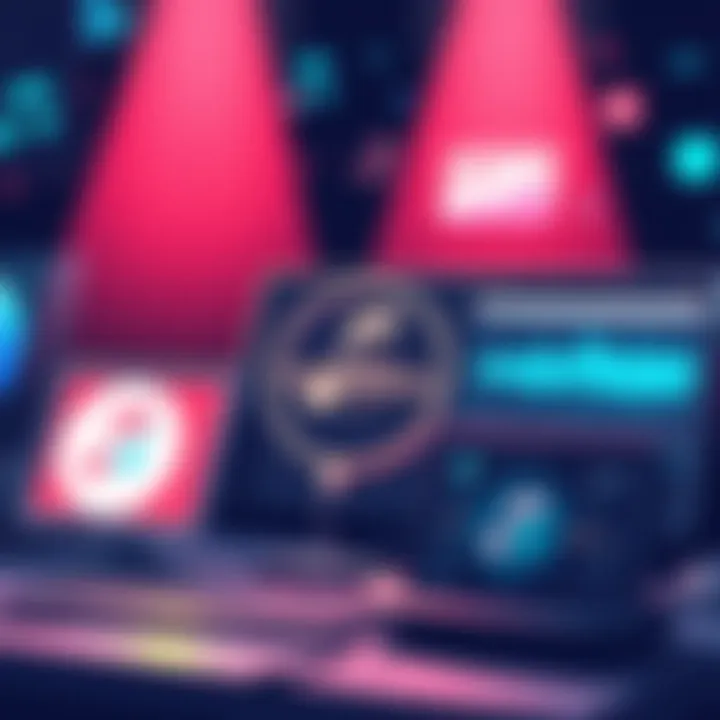
Intro
In the age of digital convenience, downloading your favorite music albums has become as easy as pie. However, the world of music downloads isn’t as straightforward as it seems. There’s a myriad of options out there, yet navigating through them requires a keen eye to spot the legitimate sites among the tangled web of illegal downloads. This guide goes beyond just telling you how to download—it immerses you in the intricacies of the music download landscape.
From grasping copyright laws, which are as vital to music as the beats themselves, to identifying reputable platforms that guarantee safety and security, this article aims to equip you with all the tools you need. Think of it as a roadmap that cuts through the noise, allowing you to relish the music you love without stepping into murky waters.
Now let’s delve into the heart of it—understanding your options and making sure that your music downloading journey is both enjoyable and lawful.
Prelims to Music Album Downloads
In an age where every note and lyric of our favorite songs can be accessed at the touch of a button, understanding the process of downloading music albums becomes crucial. The landscape has transformed dramatically over the years, making it essential for those who seek music both legally and ethically to explore their options. Knowing where to download music safely not only enriches a listener’s library but also supports the artists behind the sounds we enjoy. The ease of access can often blur the line between right and wrong, presenting a challenge for tech-savvy individuals.
Understanding the Digital Music Landscape
The digital music landscape is a vast and dynamic entity. With platforms sprouting like weeds, artists have more ways than ever to distribute their work. Spotify, Apple Music, and other streaming services have revolutionized how we consume music. In the past, getting ahold of an album meant trip to a local record store or ordering through mail. Now, everything is just a click away. However, this convenience comes with a set of responsibilities.
When diving into the murky waters of digital downloads, one must ensure they’re navigating through legal channels. Platforms that offer downloads legally not only respect copyright laws but also compensate artists for their labor. Thus, understanding which services offer albums for download versus mere streaming is of paramount importance.
Key Points:
- Accessibility: The vastness of the digital realm provides unprecedented access to music.
- Legal Navigation: Not all platforms operate under the same ethical guidelines.
- Artist Compensation: Supporting legal downloads helps artists continue making music.
The Evolution of Music Distribution
The journey of music distribution is as fascinating as the melodies themselves. From vinyl records to the digital age, how we receive music has shifted dramatically over decades. In the early days, music was a physical entity, something you held in your hands and cherished. The advent of the cassette tape, then CDs, marked significant milestones, allowing for portability and convenience. Fast forward to the dawn of the internet, and we witness the rise of piracy, which posed threats to traditional distribution methods.
Today, we see a resurgence of legitimate music purchasing thanks to platforms like Bandcamp and iTunes. They empower consumers to buy what they love, providing a sense of connection between the artist and the listener. In essence, this evolution sheds light on the balance between accessibility and the ethical considerations surrounding music consumption.
Considerations:
- Historical Context: Understanding where music distribution has come from offers insight into current trends.
- Shift to Digital: The impact of technology has fundamentally altered consumer behavior.
- Importance of Support: Buying albums directly from artists enhances the relationship between creator and consumer.
Legal Considerations for Downloading Music
It's a tricky world out there when it comes to downloading music, and understanding the legal framework surrounding it is crucial for anyone looking to expand their digital library. The laws are not only designed to protect the rights of artists and creators but also to help you stay out of hot water. Knowing what’s legal and what isn’t can prevent potential headaches down the line. Failure to comply with copyright regulations could not only lead to hefty fines but also tarnish your digital footprint. As we dive into the nitty-gritty here, it’s essential to grasp the nuances of copyright laws, the distinction between public domain and copyrighted works, and the fair use doctrine.
Copyright Laws Explained
Copyright laws are the backbone of the music industry, acting as a safeguard for creators. When a song is composed, it automatically comes under copyright protection the moment it’s put into a tangible form, whether that's a recording or sheet music. Essentially, copyright grants the creator the exclusive right to use and distribute their work, often for a set term, commonly lasting the creator's lifetime plus an additional 70 years in many jurisdictions.
It's worth noting that violating these laws can lead to significant financial penalties. The Recording Industry Association of America (RIAA) has been known for pursuing individuals and businesses that infringe on these rights vigorously. Thus, before you decide to download or share music, understanding these laws is not just smart—it’s necessary.
Public Domain vs. Copyrighted Material
Now, let’s clarify the difference between public domain and copyrighted material. Public domain works are those whose copyright has expired, which means anyone can use, share, or alter them without asking for permission or paying royalties. Think of timeless classics like Beethoven’s symphonies or early jazz recordings—these are all fair game.
On the flip side, copyrighted material is under the protection of its creator, meaning you can't use or download it without explicit permission or a proper license. Engaging with copyrighted music without the appropriate rights is like entering a minefield; one wrong step can blow up in your face. To skirt around potential pitfalls, familiarize yourself with public domain resources. Websites like Project Gutenberg (gutenberg.org) can be a treasure trove for finding free, legal music that you can download with a clear conscience.
Fair Use and Its Implications
Fair use is a legal doctrine that allows limited use of copyrighted material without having to obtain permission from the rights holders. It's often trotted out in academic settings or discussions surrounding criticism, news reporting, teaching, or research. For example, using a song for a short clip in a documentary can sometimes qualify as fair use, depending on the amount used and the context.
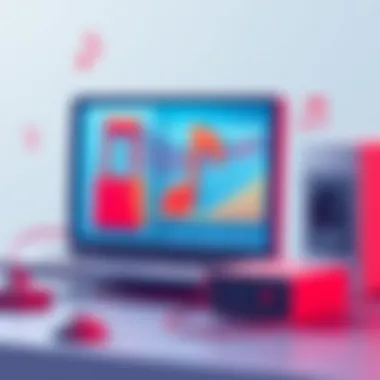
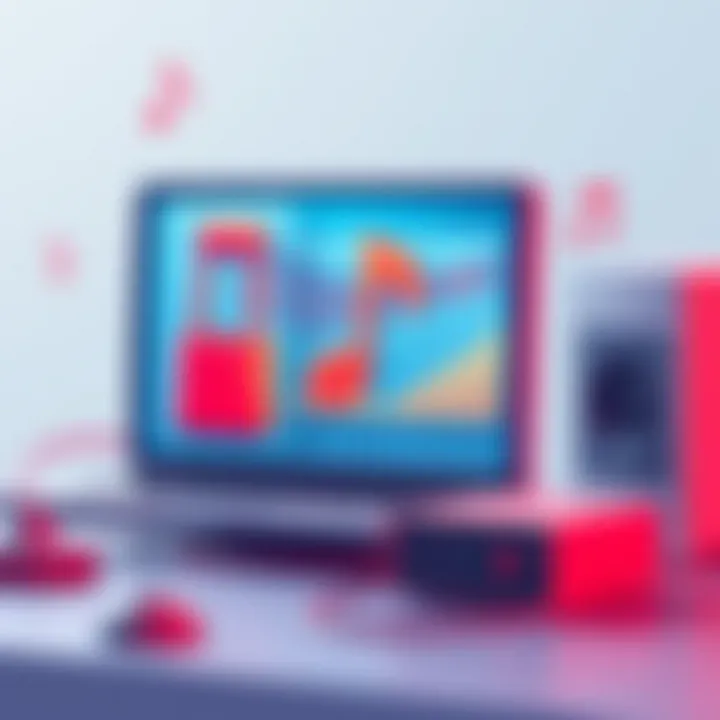
However, fair use is not as straightforward as it sounds. Various factors come into play, including the purpose of your use (commercial vs. educational), the amount of the original work used, and the effect that your use could have on the market value of the original work. Misinterpreting these factors can quickly lead to legal issues. So, while it’s not a free-for-all, knowing where fair use applies can enable you to navigate the complexities of music downloads more effectively.
"Navigating the legal landscape of music downloading isn't just savvy; it's essential. Stay informed to enjoy your tunes without the hassle."
In summary, comprehending the legal aspects of downloading music ensures that you enjoy your new albums responsibly. Ignorance of the law is rarely an excuse, so being proactive about your understanding can save you a load of trouble later on.
Top Sites for Downloading Albums Safely
Downloading music albums safely is crucial for anyone who enjoys listening to music. Choosing the right platform not only ensures that you support the artists you love but also protects your personal data and device from potential cyber threats. Numerous websites allow users to download music legally, but not all of them provide a safe experience. By sticking to reputable platforms, you gain access to high-quality music while avoiding the pitfalls of piracy and legal trouble.
Streaming Services with Download Options
Streaming services have become immensely popular in recent years, and many of them now offer options for downloading music for offline listening. Here’s a closer look at some of the leading platforms.
Spotify
Spotify stands as one of the most recognized streaming platforms worldwide, and it offers an extensive library of songs and albums. One of its key characteristics is its ease of use, allowing users to create playlists, explore new music, and discover old favorites with just a few clicks. What sets Spotify apart is its offline feature, which allows users to download tracks for offline listening. However, this capability requires a premium subscription, which could be a financial consideration for some. Still, the investment is often seen as worthwhile for those who indulge in regular music downloads.
Apple Music
Apple Music has carved out a niche for itself with a rich library of over 75 million songs and is deeply integrated with its ecosystem of devices. A standout feature is the seamless transition between your library and the streaming service, making it convenient for users to access both purchased music and Apple Music's offerings. Additionally, Apple Music allows users to download their favorite albums and songs, which makes it a superb choice for audiophiles who appreciate high-quality playback. However, compatibility can be a drawback for individuals without Apple devices, which may limit its accessibility for the broader audience.
Amazon Music
Amazon Music appeals to millions, especially those already subscribed to Amazon Prime. Its significant asset is the ability to download music without extra charges for Prime customers, which provides substantial bang for your buck. Similar to other services, it allows users to create playlists and discover new tracks. A unique benefit is the integration with Alexa, which allows voice-controlled music playback. However, some users note that its music library can vary in availability compared to other platforms, limiting access to specific albums and genres.
Dedicated Music Purchase Platforms
For those who prefer owning the music they download, dedicated music purchase sites offer an excellent alternative. Here’s a look at a few of these platforms.
Bandcamp
Bandcamp has emerged as a standout platform for independent artists to sell their music directly to fans. Its focus on supporting musicians sets it apart and positions it as a beneficial choice for those looking to support their favorite creators directly. Unique features include the ability for artists to set their pricing, often leading to an array of pay-what-you-want options. While Bandcamp's catalog is concentrated on independent music and often underrepresented genres, it might not be the first stop for mainstream albums. However, for the discerning listener, it is a goldmine of hidden gems.
iTunes
Even after the rise of streaming, iTunes remains a prominent purchase platform that offers a trusted experience for downloading music. Its well-established library allows users to buy and download songs or albums swiftly. iTunes supports a wide range of formats and integrates well with various Apple devices, ensuring a smooth user experience. While the purchasing model may not appeal to everyone, as some prefer subscriptions over ownership, iTunes still provides an option for those who value music ownership and the ability to create offline collections.
Google Play
Google Play Music was an option for many, however, it has since been transitioned to YouTube Music. This transition has raised some concerns about the changes in service. Although YouTube Music now provides options for listening and downloading, it requires a subscription for the offline features, much like its competitors. Users already in the Google ecosystem may find it an easy transition, yet the fading of Google Play Music might leave some fans feeling nostalgic for its straightforward purchasing system.
Specialized Genre Websites
Some websites cater specifically to niche music genres, providing users options to explore music that might not be easily accessible on larger platforms.
SoundCloud
SoundCloud holds a unique place in the music ecosystem with its focus on new and emerging artists. This platform is one of the best for discovering fresh sounds and underground tracks. Users can download certain tracks directly if the artist has enabled that option. While SoundCloud offers valuable exposure for independent musicians, the abundance of user-generated content can make it challenging to sift through the noise and find high-quality music. Nevertheless, the thrill of finding a hidden treasure makes it worthwhile.
Beatport
Beatport targets electronic music enthusiasts, boasting a vast library of tracks from DJs and producers. The site allows users to purchase and download individual tracks or entire albums in high-quality formats, catering specifically to club-oriented music. Beatport is known for its genre-specific charts and curated playlists, making it a go-to for those who live and breathe electronic music. However, its niche focus might leave those outside this genre at a loss, as its offerings may not appeal to all listeners.


DatPiff
If you love hip-hop, DatPiff is one of the premier websites for mixtapes. It provides free access to a trove of underground music, often featuring exclusive releases. DatPiff’s model allows users the chance to discover new artists before they hit the mainstream. However, with such a free-spirited approach, the audio quality can be inconsistent, and users must beware of potential copyright issues as many mixtapes are not officially released. That being said, for hip-hop fans, the platform can be a treasure trove.
Risks Associated with Downloading Music
Downloading music albums can be a delightful experience, but it isn't without its share of hazards. Understanding these risks not only protects your device but also ensures that your music experience remains enjoyable and lawful. In an age when information is at our fingertips, it’s all too easy to overlook what might happen when you click the ‘Download’ button on that alluring site promising the latest hits. You may end up with more than just melodies.
Malware and Other Cyber Threats
One of the most prominent dangers lurking in the murky corners of the web is malware. When you download music from unreliable sources, you open yourself up to various threats. Some of these sites may look legitimate, but don’t be fooled; they can host nasty surprises. Malware might sneak into your device, masquerading as a song file only to wreak havoc on your system.
What are some common forms of malware you should be wary of? Here are a few to consider:
- Viruses: These can corrupt files, steal your information, and even damage hardware.
- Spyware: This can track your online activities, capturing sensitive information without your knowledge.
- Ransomware: This kind of malware locks you out of your files, demanding payment to restore access. It’s like a digital hostage situation, and nobody’s winning.
Staying safe involves more than just avoiding sketchy sites. It's wise to have dependable antivirus software installed. Additionally, look out for reviews or feedback about downloading sites on forums such as reddit.com. Community insights can act as a guide to safer choices.
Legal Consequences of Piracy
While downloading music without authorization can be tempting, it often leads to legal quagmires. Copyright laws are no joke; they serve to protect the hard work of artists and producers. Ignoring these laws and opting for pirated material might seem harmless at first, but it can have significant repercussions.
Engaging in music piracy can lead to hefty fines or, in extreme cases, even criminal charges. The government is serious about enforcing copyright laws, and they don't take too kindly to those sidestepping them. The stakes are high, and what's at risk is not just your money but also your reputation.
Here are a few things to keep in mind regarding piracy:
- Fines: You could face penalties that range from hundreds to thousands of dollars.
- Legal Action: Record companies often pursue legal action against individuals they catch downloading pirated music.
- Repercussions: If you're caught in the act, it may lead to adverse record on your internet service that can result in slower bandwidth or even disconnections.
The law is as sharp as a tack; one misstep can send you down a spiral you don't want to find yourself in.
It's essential to tread carefully and respect the artists' works. Opt for legal downloads from the platforms we've discussed earlier. Not only does this support the music community, but it also protects you from the shadows of the internet where risks abound.
Enhancing Your Music Experience
When it comes to music, it's not just about having a collection; it's about how you experience it. Today, the digital landscape offers various ways to download, store, and play your favorite albums. Understanding how to enhance your music experience can turn any listening session into an immersive journey.
In this section, we'll examine two key elements that can elevate your enjoyment—format choice and organization.
Best Formats for Downloaded Music
Choosing the right audio format is crucial for getting the most out of your music. Different formats cater to different needs, and understanding which works for you can lead to significant differences in sound quality and file management.
MP3
MP3 files are perhaps the most recognizable audio format. The key characteristic of MP3 is its ability to compress audio while retaining a reasonable quality. This format is widely used because it balances file size with audio fidelity, making it ideal for casual listeners who want to save space on their devices. One unique feature is its compatibility across various platforms and devices, meaning you can play MP3s on everything from your smartphone to your car stereo.
However, MP3 files come with drawbacks. The compression involved can lead to a loss of audio detail, which might turn audiophiles away. Still, for the average listener, MP3s are easy to manage and share, making them a practical choice.
FLAC
Now, if you're someone who values sound quality, FLAC (Free Lossless Audio Codec) might be more up your alley. The pivotal aspect of FLAC is that it compresses audio without losing any information; that’s why it’s often favored by those who want to experience music in higher fidelity. This format retains all the nuances of a recording, offering a richer sound.
The unique feature of FLAC files is their versatility; they can be played on many modern music players while still being less heavy than uncompressed formats. However, it’s important to mention that FLAC files do take up more storage space compared to MP3s, so storage considerations must be weighed.
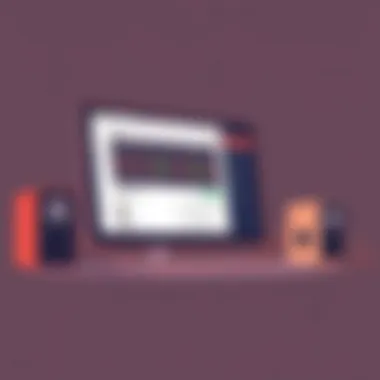
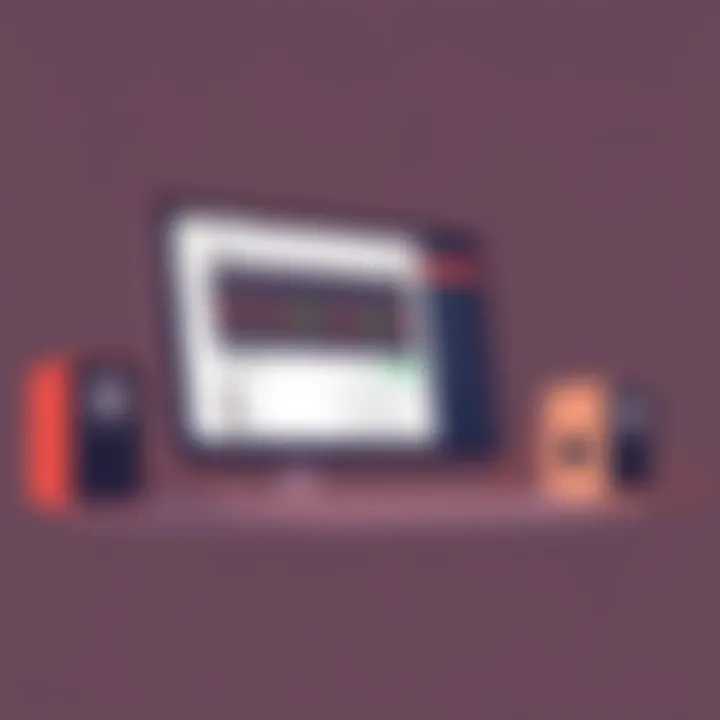
WAV
WAV (Waveform Audio File Format) is a staple in the music world due to its high-quality output. The key characteristic of WAV is that it provides uncompressed audio. This means what you get is pristine sound, making it ideal for professionals in music production or those creating high-quality mixes.
The greatest advantage of WAV files lies in their fidelity; however, this comes at the cost of vastly larger file sizes. Thus, they can be cumbersome for casual listening and managing music libraries. For anyone serious about sound quality, though, WAV files stand as the gold standard.
Organizing Your Music Library
Organizing your music library can be a daunting task, but it doesn’t have to be. A well-organized library not only improves accessibility but also enhances your overall enjoyment. Tools like iTunes, MusicBee, or even file management strategies can help streamline this process.
Consider categorizing your albums by genre, artist, or even mood; this personalization can give you an approach that fits your listening habits perfectly. Make a point of utilizing tags and metadata—this way, a quick search can pull up an entire decade of your favorite tunes in seconds.
Using Music Players Effectively
A music player is essentially your gateway to sound. However, knowing how to use it effectively can significantly enhance your experience. Whether you prefer a lightweight app like VLC or something more robust like Foobar2000, understanding the features—like setting playlists, adjusting equalizers, and exploring compatibility with formats—can make a world of difference.
"A great music player does more than just play songs; it works to bring your music to life!"
In the end, the quality of your music experience delves deeper than the mere act of downloading. It encompasses choosing suitable formats, maintaining an organized library, and utilizing music players effectively to ensure that every note resonates beautifully in your ears.
Future of Music Downloads
As we stand at a crossroads where music consumption is rapidly evolving, the future of music downloads plays a pivotal role in shaping how we experience art and sound. This section delves into significant trends that are reshaping music consumption, as well as exploring the impact of emerging technologies. Understanding these elements is essential for anyone keen on staying ahead in the ever-changing music landscape.
Trends in Music Consumption
In today's dynamic environment, the way we listen to music has shifted dramatically. Here are some key trends defining the future:
- Subscription Services: The rise of platforms like Spotify and Apple Music has solidified subscription-based models as the norm. Many users prefer access to vast libraries over owning individual tracks.
- Streaming Dominance: With an increasing number of listeners opting for streaming services, the traditional model of downloading individual albums is changing. Music streaming now represents a significant portion of the industry revenue.
- Experience over Ownership: There’s a growing emphasis on experiences, such as live shows and immersive events. Listeners are often more interested in how music integrates into their lives rather than simply acquiring it.
- Short-Form Content: Listenership is pivoting toward shorter formats, such as singles or EPs, rather than full-length albums. This caters to the fast-paced consumption patterns of today's audience.
The importance of these trends cannot be overstated, as they also dictate how artists release their work and how labels approach marketing. Understanding these trends benefits both music fans and content creators in adapting to the shifting paradigm.
Role of Emerging Technologies
Emerging technologies are at the forefront of transforming the music downloading landscape. Some key advancements include:
- Blockchain Technology: This technology promises to revolutionize music rights management and distribution. Artists can maintain more control over their work, ensuring fairer compensation.
- Artificial Intelligence: AI is shaping music recommendation systems, creating personalized playlists based on user preferences. This technology helps listeners discover new content that aligns with their tastes.
- Augmented and Virtual Reality: These technologies offer innovative ways to experience music. Fans can attend virtual concerts that authorize real-time interactions with artists and visuals, redefining live music.
- 5G Technology: The rollout of 5G networks enhances streaming quality and reduces latency, making it easier to access high-quality content without buffering. This change can bolster the appeal of music streaming services.
The blend of these technologies with the evolving trends in music consumption suggests a future where music is less a possessive act and more an immersive experience. The possibilities are vast, and those willing to adapt will find themselves at the forefront of a new musical era.
Epilogue
The conclusion serves as a vital component in our discussion about downloading music albums safely and legally. Wrapping up the myriad elements we've touched on, it’s essential to reaffirm the importance of making informed choices in today's digital landscape. With the vast array of platforms, understanding the legal implications, and recognizing the associated risks, tech-savvy individuals must steer their paths wisely through this intricate tapestry.
Summarizing the Key Points
To summarize, we discussed several key points throughout this guide that are crucial to safely downloading music albums:
- Legal Considerations: An awareness of copyright laws, public domain content, and fair use helps you navigate the often murky waters of digital music.
- Safe Sites: Various reliable platforms like Bandcamp and iTunes offer legal avenues for securing the music you love without the dreaded consequences of piracy.
- Risks Involved: Risks such as malware exposure and legal repercussions can loom over careless downloading practices. Being vigilant and informed mitigates these dangers.
- Enhancing Experiences: From selecting the right file formats to organizing your library, optimal usage of downloaded music can significantly enhance your listening experience.
- Future Trends: The landscape is shifting; staying aware of upcoming trends opens doors to new methods of music consumption.
Encouragement for Informed Choices
Encouragement for informed choices goes beyond just knowing where to download music; it's about understanding the landscape. Take the time to assess various sites and determine which fit your needs best.
- Research: Dig deeper into any platform you consider using. Read reviews, and check user experiences.
- Educate Yourself: Familiarize yourself with music laws and ethical downloading practices. Knowledge empowers you.
- Stay Updated: Keep an eye on emerging technologies and trends in music consumption, like blockchain or AI-powered platforms. They can revolutionize how you interact with music in the future.
"Informed choices lead to safer and more enjoyable music experiences."
Ultimately, the goal is to access the music you adore while upholding the ethical standards that underlie this vibrant industry. By making informed decisions, you’ll be part of a thriving community that supports artists and values the integrity of music.



